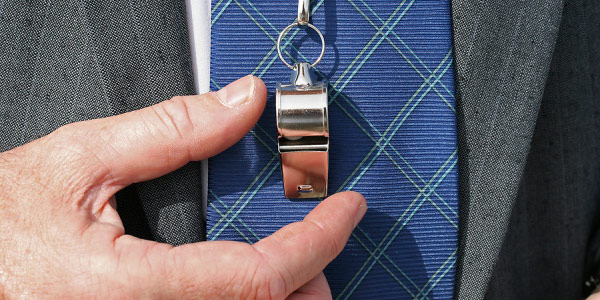KENNEWICK — A referee’s job, contrary to the uniform, is far from black and white.
There is more gray in determining what is fair play and what crosses the line.
The Washington Interscholastic Activities Association, which oversees high school athletics in the state, tracks ejections across all sports.
Though the number of ejections in several sports, including football and boys basketball, have been climbing, the WIAA is particularly concerned about what is happening in boys soccer.
The WIAA noticed a disturbing trend during several years in the number of ejections for violent conduct and abusive language. In spring 2009, there were 42 ejections for violent conduct and 47 for abusive language.
It was the result of an “imperfect storm,” said John Miller, a WIAA assistant executive director.
“I think it had to do with a lot of different things,” he said. “Soccer is becoming a much more physical sport, and because of its nature, there’s a lot more retaliation.”
WIAA officials met with coaches as well as league and school officials to try to address the problem. Though the total number of ejections for violent conduct and abusive language declined the next spring, it wasn’t enough to satisfy the WIAA.
Officials decided that tougher disciplinary action was needed in boys soccer, but school officials wanted a more defined understanding of violent conduct and abusive language.
“The state’s response initially was very vague because of the somewhat subjective nature of the job,” said Ken Murray, Southridge High School’s athletic director. “Officials (in the games) have to make the call and do what they believe is right.”
Effective last spring, the WIAA executive board’s boys soccer policy requires players who are ejected for violent conduct or abusive language to receive a three-game suspension.
The definition of violent conduct in boys soccer applies to acts on and off the field, regardless of whether the ball is in play.
Violent conduct also includes using “excessive force or brutality” against an opponent “when not challenging for the ball,” as well as against a teammate, spectator, official or other person, according to the WIAA policy.
“That’s the definition that the referees have to work with,” said David Braun of the Tri-Cities Soccer Referees Association. “In their opinion, is it excessive or not excessive? It’s a judgment call. If you referee long enough, you know what’s excessive and not excessive.”
Regarding abusive language, the criteria can be difficult to define.
“Each referee has his own idea,” Braun said. “It’s the tone with which the word is said, and is it directed at somebody? Is it directed at a referee or a player? Is it public (by being heard off the field)?”
The boys soccer suspension policy is the most severe in WIAA-sanctioned sports. In sports such as football or basketball, a player is suspended for one game if he or she is ejected for violent conduct or abusive language.
If a player in any sport is ejected for a second time, he or she will miss the rest of the season.
Other sports have seen a statewide rise in player ejections. In football, there were 122 player ejections in the 2010-11 school year — a 22 percent increase from the previous season.
“We’ve had conversations with the football coaches association, and in fact, one of the things we’re concerned about is that number,” said WIAA executive director Mike Colbrese. “But because we don’t have the history we have with soccer — we haven’t seen a trend — we’re not as concerned as what we’ve seen with soccer.”
Because of the tougher suspension policy in boys soccer, there is a heightened concern among soccer officials to make accurate calls.
“We talk to our referees in our meetings about this issue and how important it is to get it right — to ensure misconduct has occurred before you write it up that way,” Braun said.
Players have been informed about the WIAA policy, which includes a postseason ban if a team receives three red cards in a season for violent conduct or abusive language.
“We made sure we talked about (the ejection policy) before the start of the season,” Southridge boys soccer coach Chip Elfering said. “We had it on the whiteboard in the locker room all year long. That way, they were well aware of what their actions could do to the whole team.”
The heightened awareness seems to be working across the state.
In boys soccer during the 2010-11 school year, there were 129 player ejections in Washington.
That was down 26 percent from 175 ejections the previous season.
And the totals for violent conduct and abusive language also fell.
“I think it’s going to take a few years to turn that culture around, but I believe we’re headed in the right direction,” Miller said.
There still is work to do. While boys soccer ejections declined during the regular season, Colbrese said, they increased in the postseason.
Also, not everyone is on board with the three-game suspension rule.
“I think it should be a lesser suspension, maybe one game, two at the max,” said former Southridge midfielder Adolfo Garcia, who graduated last year. “If it happened again and again, then the league could intervene and set another ruling — if you get so many (yellow cards) or reds, they could suspend you for a set number of games.”
Another point of frustration for players and coaches is how officials might call a game.
Last season, the Wapato High School boys soccer team, which competes in the Central Washington Athletic Conference, received two red cards for abusive language.
Former Wapato coach Aaron Gillespie said one of his players got a red card after throwing up his hand after being called for a foul.
“It was not necessarily doing a middle finger, but it was kind of disrespectful, kind of like ’f— off,’ ” Gillespie said. “That’s how the ref took it.”
Gillespie said another player was kicked out of the game after taking issue with his teammate’s ejection.
“He said: ’What? That’s so stupid!’ For that, he got a red card,” Gillespie said.
Officials in all sports face the task of trying to manage emotion in a competitive atmosphere. When play appears to be getting heated, referees might employ preventative officiating, such as giving warnings without calling a foul.
“Especially on post play (in basketball) where it gets a bit rough,” said Don Schumacher, Kamiakin High School’s athletic director. “They might say: ’Back off. Watch the hands.’ “
For the most part, players and coaches seem to listen to the officials, even if they do not always agree.
“Some refs are nicer than others,” Garcia said. “They’d give a warning, and others were a bit more harsh. They’d give a yellow or a straight red for a profanity.”
Murray said he must remind players, coaches, parents, fans and even himself that their perception of what happens on the field or court might be altered by what they want to see.
“We have no way to be objective,” Murray said. “We’re going to look at it through our colored glasses.”
Read more here: http://www.bellinghamherald.com/2012/01/30/2372526/foul-play-on-rise-in-high-school.html#storylink=cpy
Read more here: http://www.star-telegram.com/2012/01/25/3688274/utas-new-sports-arena-comes-fully.html#storylink=cpy
Read more here: http://www.star-telegram.com/2012/01/25/3688274/utas-new-sports-arena-comes-fully.html#storylink=cpy
Read more here: http://www.star-telegram.com/2012/01/25/3688274/utas-new-sports-arena-comes-fully.html#storylink=cpy







